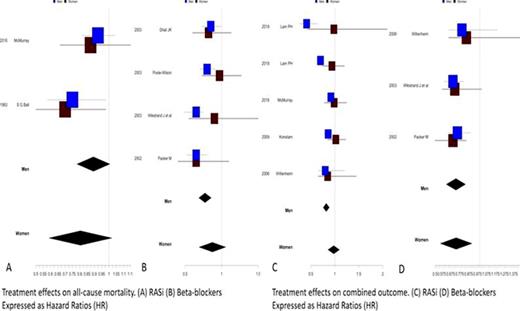-
PDF
- Split View
-
Views
-
Cite
Cite
C Danielson, G Lileikyte, T.H.K Teng, W Ouwerkerk, C.S.P Lam, D Erlinge, Sex differences in pharmacological therapy among heart failure patients: a systematic review and meta-analysis, European Heart Journal, Volume 41, Issue Supplement_2, November 2020, ehaa946.1058, https://doi.org/10.1093/ehjci/ehaa946.1058
Close - Share Icon Share
Abstract
Renin Angiotensin System Inhibitors (RASi) and Beta-Blockers (BB) have been proven effective in trials of heart failure with reduced ejection fraction (HFrEF) in which men were overrepresented. Recent studies have suggested sex differences in pharmacological therapy benefits in HF. We aimed to perform a systematic review and meta-analysis comparing treatment effect among women and men with HFrEF.
Systematic search was performed on PubMed, Cochrane Library and Embase for RCTs published 1990–2019. Treatments included BB and RASi. Selected outcomes were all-cause mortality and combined outcome of all-cause mortality and/or hospitalisation for heart failure. Mean characteristics of articles included in data extraction were estimated by combined fixed-and random-effects meta-analysis. Z-scores for outcomes in sex were analysed using R software.
Of 2188 articles identified through search, 26 articles and 103 746 patients [mean age 62±1.8 years, women 22.2%, mean LVEF 26.2±31.4%] were included in the meta-analysis. For all-cause mortality, there was a significant reduction in risk for men with HFrEF prescribed BB [HR 0.77 (0.69–0.86)] compared to no significant benefit in women [HR 0.87 (0.69–1.05)]; similarly there was a borderline significant reduction in risk for men with HFrEF prescribed RASi [HR 0.89 (0.78–1.00)] compared to no significant benefit in women [HR 0.80 (0.59–1.02)]. For the composite outcome of all-cause mortality and HF hospitalisation, there was significant reduction in risk in both women and men treated with BB (men [HR 0.73 (0.63–0.84)]; women [HR 0.74 (0.56–0.91)]); however significant risk reduction with RASi was observed in men [HR 0.82 (0.76–0.88)] but not women [HR 0.98 (0.86–1.09)]).
Our meta-analysis revealed potential sex differences in response to HFrEF therapies, where beneficial effects of RASi appeared more prominent in men compared to women. While mortality benefits with BB were also more prominent in men, reduction in the composite outcome of all-cause mortality and HF hospitalization with BB were evident in both men and women with HFrEF.

Effects of treatment on the outcomes
Type of funding source: None



